Biographical Information for Then and Now: Advances in Wounded Warrior Rehabilitation Care

Course Directors
 | RORY A. COOPER, PhD Contact Information |
Rory A. Cooper, PhD received the BS and MEng degrees in electrical engineering for California Polytechnic State University, San Luis Obispo in 1985 and 1986, respectively. He received the Ph.D. degree in electrical and computer engineering with a concentration in bioengineering from University of California at Santa Barbara in 1989. He is FISA & Paralyzed Veterans of America (PVA) Chair and Distinguished Professor of the Department of Rehabilitation Science and Technology, and professor of Bioengineering, Mechanical Engineering, Physical Medicine & Rehab, and Orthopedic Surgery at the University of Pittsburgh. Dr. Cooper is Founding Director and VA Senior Research Career Scientist of the VA Rehabilitation Research and Development Center of Excellence in Pittsburgh. He is also the Co-Director of the NSF Quality of Life Technology Engineering Research Center, a joint effort between the University of Pittsburgh and Carnegie Mellon University. He is the Editor of the journal Assistive Technology and the AT Research Book Series of IOS Press. Dr. Cooper serves or has served on the editorial boards of several prominent peer-reviewed journals in the fields of rehabilitation and bioengineering. He has received multiple prestigious awards to include the Olin Teague Award, Paul Magnuson Award, U.S. Army Outstanding Civilian Service Medal, James Peters Award, Maxwell J. Schleifer Award,DaVinci Lifetime Achievement Award, Veteran’s Leadership Program Veteran of the Year, and a member of the inaugural class of the Spinal Cord Injury Hall of Fame. Dr. Cooper has authored or co-authored over 200 peer-reviewed journal publications. He has ten patents awarded or pending. Dr. Cooper is the author of two books: Rehabilitation Engineering Applied to Mobility and Manipulation and Wheelchair Selection and Configuration, and co-editor of An Introduction to Rehabilitation Engineering, Care of the Combat Amputee, and the Warrior Transition Leader Medical Rehabilitation Handbook. Dr. Cooper is an elected Fellow of the Rehabilitation Engineering and Assistive Technology Society of North America (RESNA), the Institute of Electrical and Electronics Engineers (IEEE), the American Institute of Medical and Biological Engineering (AIMBE), and the Biomedical Engineering Society (BMES). Dr. Cooper has been an invited lecturer at many institutions around the world, for example the National Academies of Sciences Distinctive Voices Lecture, and was awarded Honorary Professor at The Hong Kong Polytechnic University and Xi’an Jiatong University. He has also been elected to Eta Kappa Nu, Tau Beta Pi, and Sigma Xi honorary societies. Dr. Cooper is a former President of RESNA, and a member of the RESNA/ANSI and ISO Wheelchair Standards Committees, and IEEE-EMBS Medical Device Standards Committee. In 1988, he was a bronze medalist in the Paralympic Games, Seoul, Republic of Korea. He was on the steering committee for the 1996 Paralympic Scientific Congress held in Atlanta, GA, and the Sports Scientist for the 2008 U.S. Paralympic Team in Beijing, China. In 2009, Dr. Cooper was featured on a Cheerios cereal box for his many achievements. He has been a member of the U.S. Centers for Medicare and Medicaid Services – Medicare Advisory Committee, Steering Committee of the Academy of PM&R on Research Capacity Building. and Chair of the National Advisory Board on Medical Rehabilitation Research, National Institute of Child Health & Human Development, and National Academy of Sciences Keck Foundation Initiative on Human Health Span Steering Committee. Dr. Cooper is a U.S. Army veteran with a spinal cord injury and a Director of the Paralyzed Veterans of America Research Foundation. He currently serves as a member of the U.S. Secretary of Veterans Affairs Prosthetics & Special Disability Programs Advisory Committee, U.S. Department of Defense Health Board Subcommittee on Amputation and Orthopedics, and the Board of Directors of Easter Seals. Dr. Cooper has actively collaborated with the Indian Spinal Injuries Centre on increasing access to quality services and devices for people with disabilities in India and throughout developing countries. | |
 | PAUL F. PASQUINA, MD Colonel (RET), U.S. Army Medical Corps Contact Information
|
Paul F. Pasquina, M.D. is the Residency Director and Chair, Physical Medicine & Rehabilitation and Director of the Center for Rehabilitation Sciences Research at Uniformed Services University of the Health Sciences, Walter Reed National Military Medical Center. Dr. Pasquina retired from the United States Army Medical Corps in 2012 as Chief of the Department of Orthopaedics and Rehabilitation at Walter Reed National Military Medical Center and the Director of the Center for Rehabilitation Sciences Research (CRSR) at the Uniformed Services University of the Health Sciences (USUHS). He is a graduate of the United States Military Academy at West Point and USUHS. In addition to being board certified in Physical Medicine & Rehabilitation (PM&R), he is also board certified in Electrodiagnostic Medicine and Pain Medicine. He completed a fellowship in sports medicine and remains interested in all aspects of musculoskeletal medicine especially as it applies to individuals with disabilities. He is the specialty consultant to the Army Surgeon General for Physical Medicine & Rehabilitation and a Secretarial appointee on the Department of Veterans Affairs (VA) Advisory Committee for Prosthetics and Special Disabilities Programs. Dr. Pasquina has authored multiple book chapters, journal articles and policy papers. He has served as the PM&R Residency Program Director and Medical Advisor to the North Atlantic Regional Medical Command for quality healthcare. He has received multiple military awards, as well as awards for teaching and mentorship, including the U.S. Army’s “A” Proficiency Designation for academic excellence, the Order of Military Medical Merit, and Honorary Fellow of the Rehabilitation Engineering and Assistive Technology Society of North America (RESNA). | |
Guest Faculty and Presenters
 | LTC (Ret) Nelson Hager, MD, MS Vice Chairman Department of Physical Medicine & Rehabilitation, USUHS
|
Lieutenant Colonel (Ret) Nelson Hager, MD, MS, is the Principal Investigator for the Collaboratory for Musculoskeletal Injury Rehabilitation Research (CMIRR), Vice Chairman of the Department of Physical Medicine & Rehabilitation (PM&R) and faculty member at the Uniformed Services University of the Health Sciences (USUHS). His current board certifications included PM&R, and Sports Medicine. He is RMSK certified for musculoskeletal ultrasound from the American Registry for Diagnostic Medical Sonography. He has a particular clinical and research interest in diagnostic and interventional ultrasound as well as regenerative medicine. He has established himself as a national leader in Musculoskeletal Ultrasound education and investigation over the past 15 years – directing & presenting numerous educational seminars, various book chapters, with additional editorial credits in the field of musculoskeletal medicine and ultrasound. Dr Hager received his undergraduate degree at USMA and his initial service in the military was as an infantry office culminating in service as a Company Commander for two light infantry companies and as aide-de-camp for two consecutive Commanding Generals, 7th Infantry Division. He completed a Masters of Science Program at Indiana University prior to returning as a faculty and research officer in the Dept of Physical Education at the United States Military Academy. Subsequently, he received his medical degree from USUHS. As a military medical corps officer he served in various capacities to include; Deputy Commander for Clinical Services at Hawley Army Community Hospital, Assistant Chief of PM&R at Madigan Army Medical Center, Chief of the Dept of PM&R at Tripler Army Medical Center, and Chief of PM&R at Walter Reed Army Medical Center during 9/11. Since military retirement, Dr Hager has served in private practice and academic medicine positions to include; Musculoskeletal Fellowship Director- Northwest Spine and Sports Physicians, Associate Clinical Professor in the Dept of PM&R University of Washington and Medical director of the Bone and Joint Clinic, Medical Director of the Sports, Orthopedics and Spine Health Center, Franciscan Health System and attending faculty at VA Puget Sound Health Care, Tacoma, Washington. He has served as a team physician and race coverage physician in various sports settings along with sports coverage of the Vancouver Winter Paralympics in 2010. Dr Hager has received various military and academic awards to include; the Outstanding PMR Resident and Resident Research reward, the Order of Military Medical Merit, Meritorious Service Medal (4), Global War on Terrorism Service Medal, Ranger Tab, Airborne Parachutist Badge and the Expert Infantryman’s Badge. | |
 | Dr. Douglas G. Smith Professor Emeritus Department of Orthopaedic Surgery, University of Washington douglas.smith1.ctr@usuhs.edu
|
Douglas G. Smith, MD is the Henry M. Jackson Foundation for the Advancement of Military Medicine’s Chief Orthopaedic Advisor for The Center for Rehabilitation Sciences Research. He is Professor Emeritus in the Department of Orthopaedic Surgery at the University of Washington, and Harborview Trauma Center in Seattle. He is also a Professor of Physical Medicine and Rehabilitation at the Uniformed Services University of the Health Sciences in Bethesda, Maryland. Dr. Smith received his undergraduate degree at the University of Notre Dame, and his medical degree at the University of Chicago. Dr. Smith served as the director of Prosthetics Research Study, a non-profit laboratory dedicated to advancing care for the amputee. He also served the Veterans Administration on their federal advisory committee for Amputations, Prosthetics and Special Disabilities; the VA merit review grant committee, and served as an associate editor for the VA’s Journal of Rehabilitation, Research and Development. He was on the Advisory Board for the US Military Amputee Care Program from 2001-2008. He has also recently participated on a training exercise for the US Navy Hospital Ship The Comfort. Dr. Smith was the lead editor of the 3rd Edition of the Atlas of Amputations and Limb Deficiencies – Surgical, Rehabilitation and Prosthetic Principles, Published by the American Academy of Orthopaedic Surgeons. He has authored or co-authored over 125 peer-review publications, 21 textbook chapters and 2 books. Dr. Smith served as the Medical Director for the Amputee Coalition of America (ACA) from 2000 to 2008. For the ACA, he published over 35 consumer articles on amputation surgery and rehabilitation, which are available for free at the ACA web site. Consumer publications such as the ACA’s InMotion Magazine provide a unique educational role for individuals with limb loss, for their families and for the general public. Dedicated to improving the quality of amputation surgery, he has taught for the AAOS at their instructional courses on amputation surgery, and through Prosthetics Research Study developed a free, just-in-time educational site for amputation surgery housed as a part of the UW - Department of Orthopaedics & Sports Medicine web based learning center. | |
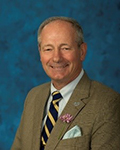 | Fred Downs, MBA, BS Prosthetic Consultant Paralyzed Veterans of America freddowns@aol.com
|
Fred Downs was the first Chief Procurement and Logistics Officer for the Veterans Health Administration (VHA), Fred established and was responsible for overseeing and controlling the 12 billion dollars a year spent in the VA health care system throughout 154 VA medical centers, 1000 outpatient clinics, and sixty-four nursing homes, and later implemented a supply chain management system. He initiated action to centralize 3000 contracting officers under his direct command and mandated certification and continuing education requirements for every contracting officer. Fred was responsible for the development of the Strategic Asset Management project; a multi-year development initiative that would replace the VA’s existing asset and inventory management systems with a single, web-based, integrated, enterprise-level system. In conjunction, he served as co-chair to the VHA real-time location system national committee to accelerate strategic planning and action. In addition to those duties, he worked on special assignments for the Department of Defense (DOD) and the State Department’s Agency for International Development (USAID) to develop prosthetic projects in areas of civil conflict. Fred has authored three books and numerous articles for newspapers and magazines on veteran and humanitarian issues and lectured at West Point and numerous other educational venues on the subjects of leadership and government. | |
 | Stuart Campbell, PT, MPT United States Army MEDCOM stuart.m.campbell.civ@mail.mil
|
Stuart Campbell is the Chief, Global Health Engagement (GHE) for the Extremity Trauma and Amputation Center of Excellence (EACE). His position entails engaging with U.S. and international partners to share information, coordinate mutual activities, and advance the care of people with limb loss around the world. This role entails collaboration with individuals and organizations across the entire care continuum from individual clinicians to high government officials. Recent collaborations include working with representatives from the Association of Southeast Asian Nations Center for Military Medicine to develop a plan to standardize amputation care across the Southeast Asian region. Mr. Campbell retired in March 2010 after serving in the Army for 24 years. He had multiple deployments around the world in his capacity as a Special Forces Operator and as an Army physical therapist. Since retirement Mr. Campbell has worked as a clinician, the program manager at the Center For the Intrepid at Brooke Army Medical Center and the Chief GHE at the EACE. Mr. Campbell holds Bachelor of Science degree in Exercise Physiology from the University of Massachusetts Lowell and a Master of Physical Therapy degree from Baylor University, through the US Army Baylor University Graduate Program in Physical Therapy. | |
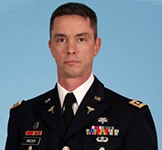 |
COL Stanley Breuer Chief of OT Service stanley.t.breuer.mil@mail.mil |
Colonel Stan Breuer is the Chief of the Occupational Therapy Service at Walter Reed National Military Medical Center (WRNMMC), Bethesda, Maryland. He received his commission through the Reserve Officers’ Training Corps (ROTC) at East Stroudsburg University, Pennsylvania. He earned his Master of Science degree in Occupational Therapy from San Jose State University, and his Occupational Therapy Doctorate from Rocky Mountain University of Health Professions. He is an Occupational Therapist and board Certified Hand Therapist specializing in upper extremity rehabilitation, behavioral health and general rehabilitation. COL Breuer has served in a variety of leadership, clinical and corporate positions throughout his career. His past duty assignments include; US Army TBI Program Manager, Office of The Surgeon General (OTSG); Chief, Rehabilitation and Reintegration Division, OTSG; and Occupational Therapy Consultant to The Army Surgeon General. | |
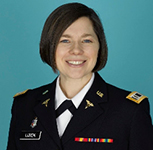 | CPT Michelle L. Luken, DScOT, OTR/L Officer in Charge, OT Clinic, WRNMMC
|
Captain Michelle L. Luken, DScOT, OTR/L, is the Officer in Charge of the Behavioral Health Occupational Therapy Clinic at Walter Reed National Military Medical Center. She is a graduate of the Army-Baylor Doctor of Science in Occupational Therapy Program. She has been an occupational therapist for 10 years. Her last assignment was Chief of Occupational Therapy at Fort Drum, NY. She was also attached to the 1st Battalion, 87th Infantry Regiment as a Battalion Occupational Therapist in support of FORSCOM’s Soldier Readiness Test (SRT) Pilot Program Evaluation. She remains involved in human performance optimization and injury prevention. She has conducted original research on improving marksmanship among Soldiers with crossed hand-eye dominance. | |
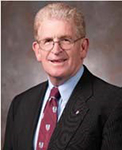 | Eric B. Schoomaker, MD, PhD Lieutenant General, US Army (Ret) 42nd Army Surgeon General & Former Commanding General, US Army Medical Command Professor and Vice Chair for Leadership, Centers & Programs Department of Military & Emergency Medicine Uniformed Services University
|
LTG (Ret) Schoomaker, prior to his retirement after 32 years of active service, served as the 42nd U.S. Army Surgeon General & Commanding General of the U.S. Army Medical Command. He committed his career to meeting the health needs of soldiers, their families and veterans throughout the U.S., Europe and the Pacific, focusing on soldier medical readiness, enhancing battlefield care, establishing comprehensive behavioral healthcare, fostering a culture of trust, advancing comprehensive pain management, and promoting health by preventing combat wounds, injury and illness. He is a Professor and Vice-Chair for Leadership, Centers and Programs in the Department of Military & Emergency Medicine, F. Edward Hebert School of Medicine at the nation’s only Federal health university, the Uniformed Services University of the Health Sciences (USU) in Bethesda, MD. His principal interests are in both Complementary and Integrative Health & Medicine (CIHM) in the shift from a disease management-focused healthcare system to one more centered on the improvement and sustainment of health & well-being leading to optimal human performance. He promotes CIHM education and training for physicians and other health professionals, especially as they contribute to the management of acute and chronic pain. Doctor Schoomaker is also exploring the central importance of leadership education and training for health professionals, so as to realize USU’s vision as the nation’s “health leadership academy." | |
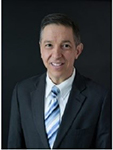 | Dr. Gerry Malanga New Jersey Medical School |
Dr. Gerry Malanga is board certified in Physical Medicine and Rehabilitation (PM&R) and Pain Medicine. He is an Associate Professor of PM&R at UMDNJ - New Jersey Medical School, Director of Pain Management at Overlook Pain Center in Summit, NJ, and in private practice at Associates in Rehab Medicine located in Morristown. Dr. Malanga holds several other prestigious positions including Medical Director, Consultant for Horizon Healthcare Worker's Compensation Services, Blue Cross & Blue Shield Worker's Compensation and Clinical Chief, Rehabilitation Medicine and Electrodiagnosis at St. Michael's Medical Center, Newark, NJ.As an active member of many professional organizations, Dr. Malanga currently serves as Chairman, Public Education Committee, North American Spine Society (NASS). He is the Past President of the Physiatric Association of Spine, Sports, and Occupational Rehabilitation (PASSOR) and a Fellow, American College of Sports Medicine and American Academy of Physical Medicine and Rehabilitation. Dr. Malanga is also a member of the American Pain Society and Minnesota Medical Association. Dr. Malanga has lectured throughout the country on a variety of musculoskeletal and spine topics. He is a prolific author with more than 60 publications including original research and book chapters. He has edited a textbook entitled Whiplash and will publish a new textbook with accompanying DVD on Musculoskeletal Physical Examination in October 2005. Dr. Malanga is a highly regarded physician who has received multiple awards including Best Doctor in the New York Metro area 2003-2005. | |
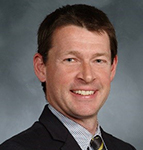 | Dr. Alfred Gelhorn Weill Cornell Medicine
|
Dr. Alfred Gelhorn is an Associate Professor of Rehabilitation Medicine and the Director of Sports Medicine at Weill Cornell in New York, NY. He completed his medical school training at the University of Pennsylvania and residency at the University of Washington in Seattle. He is board certified in Sports Medicine and holds additional credentialing in musculoskeletal ultrasound. His clinical and research interests include the treatment of acute and degenerative joint and tendon injuries, with a focus on emerging regenerative treatments. He is currently involved in a number of research studies evaluating placental allografts and platelet rich plasma for the treatment of osteoarthritis. He lives in Philadelphia with his wife and two daughters. | |
 | Dr. Scott Primack Colorado Rehab |
Dr. Scott Primack one of the founding partners of CROM, is a 1988 graduate of the University of Osteopathic Medicine and Health Sciences, with subsequent residency training in physical medicine and rehabilitation at the Rehabilitation Institute of Chicago. He received his board certification from the American Board of Physical Medicine and Rehabilitation and the American Board of Electrodiagnostic Medicine. The primary focus of Dr. Primack’s practice is the diagnosis and treatment of patients with musculoskeletal disorders. He performs electrodiagnostic studies, diagnostic musculoskeletal ultrasound, interventional lumbar spine injections and osteopathic manipulation. He currently serves as Medical Director for the Colorado Special Olympics. Dr. Primack has Level II Full Accreditation from the Colorado Division of Workers’ Compensation. His area of research is in the design and implementation of functional outcome measures. | |
Faculty Disclosure
All individuals in a position to control the content of this education activity including members of the planning committee, speakers, presenters, authors, and/or content reviewers have disclosed all relevant financial relationships with any entity producing, marketing, re-selling, or distributing health care goods or services, used on, or consumed by, patients.
The following relevant financial relationships were disclosed:
Dr. Douglas Smith: Grant Research: USUHS-Center for Rehabilitation Sciences Research Grants
Medical Advisory Board for AOPA ( American Orthotic & Prosthetic Assoc)
Dr. Peter Rubin: Grant Research: MTF
Consultant for Cohera, Sofregan
Stockholder: Strathspey-crown
No other planners, members of the planning committee, speakers, presenters, authors, content reviewers and/or anyone else in a position to control the content of this education activity have relevant financial relationships to disclose.
CME Accreditation and Designation Statement
This activity has been planned and implemented in accordance with the accreditation requirements and policies of the Accreditation Council for Continuing Medical Education (ACCME) through the joint providership of University of Pittsburgh School of Medicine and the Center for Rehabilitation Science Research at the Uniformed Services University for the Health Science. The University of Pittsburgh School of Medicine is accredited by the ACCME to provide continuing medical education for physicians.
The University Of Pittsburgh School Of Medicine designates this live activity for a maximum of 6.5 AMA PRA Category 1 Credits™. Physicians should claim only the credit commensurate with the extent of their participation in the activity.
Other health care professionals are awarded 0.6 continuing education units (CEU’s) which are equal to 6.5 contact hours.
Disclaimer Statement
The information presented at this CME program represents the views and opinions of the individual presenters, and does not constitute the opinion or endorsement of, or promotion by, the UPMC Center for Continuing Education in the Health Sciences, UPMC / University of Pittsburgh Medical Center or Affiliates and University of Pittsburgh School of Medicine, the Uniformed Services University of the Health Sciences or the Department of Defense. Reasonable efforts have been taken intending for educational subject matter to be presented in a balanced, unbiased fashion and in compliance with regulatory requirements. However, each program attendee must always use his/her own personal and professional judgment when considering further application of this information, particularly as it may relate to patient diagnostic or treatment decisions including, without limitation, FDA-approved uses and any off-label uses.







